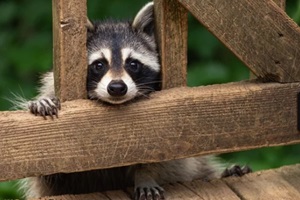 Raccoons might look like cuddly creatures on social media, but they can be dangerous pests when they get too close to humans. These critters pose numerous health threats to humans, including rabies and other serious diseases, puncture wounds from bites, gashes from their sharp claws, and more.
Raccoons might look like cuddly creatures on social media, but they can be dangerous pests when they get too close to humans. These critters pose numerous health threats to humans, including rabies and other serious diseases, puncture wounds from bites, gashes from their sharp claws, and more.
Homeowners with raccoons in their houses face greater threats than they might from other pest problems, such as spider infestations or bees’ nests. If you have a raccoon in your home, it is essential that you understand what to do (and what to avoid) to keep yourself, your pets, and your family safe.
Here are some tips to safely handle an indoor raccoon encounter.
When a Raccoon Is Indoors: Dos and Don’ts
Raccoons come indoors for a variety of reasons. They might be attracted to food in your home or are seeking shelter and comfort from the elements and predators. No matter the reason, as soon as you know there is a raccoon in your building:
Do
- Stay calm – Excitability, dramatic movements, and frantic panic can elicit a more aggressive response from an animal that may already be scared, confused, and lost.
- Guide the raccoon outside – When it is safe to do so, open doors, windows, or other exit points to allow the raccoon to make its own way out of the house. You can create barriers or close other doors to gradually limit the raccoon’s options until its best choice is to leave, but once these methods are set up, it is best to leave the area entirely.
- Contain pets – Collect pets in the home and secure them in a safe place, such as a crate or inside a room with a door. If you do not know where the raccoon is in the home, it may be best to board the pets outside the home until the issue is resolved.
- Call pest control professionals – Getting a raccoon out of a home can be a dangerous endeavor, and it is best left to experts who have safety gear and tools.
- Seek medical attention if necessary – If the raccoon attacked you, it is important to seek medical care, even if the animal only scratched you or did not break the skin. Any kind of confrontation can spread disease.
Don’t
- Make eye contact – Raccoons may interpret direct eye contact as aggression or confrontation, prompting them to lash out.
- Corner the animal – A raccoon that is cornered is more likely to defend itself.
- Offer food – While you can make a trail to the outside using tempting food items such as cheese or sweet fruit, do not actively offer food to the animal. This can elicit bites or encourage the raccoon to come back after it has left the house.
- Attempt to catch it – Raccoons are aggressive fighters when they need to be. Whether you attempt to catch the raccoon in a trap or in a towel, it will likely fight back and might even escape into a more problematic location in the home in fear.
Stopping Raccoons from Coming Inside
The best way to handle raccoons on your property is to prevent them from entering the home at all. Identify openings that could provide easy access to your home’s attic, crawl space, or other constrained areas, such as closets.
 Most adult raccoons can fit through holes as small as six inches, and females may get through even smaller openings. For perspective, the length of a US dollar bill is about six inches. Professional pest control services are a good option for raccoon-proofing your home.
Most adult raccoons can fit through holes as small as six inches, and females may get through even smaller openings. For perspective, the length of a US dollar bill is about six inches. Professional pest control services are a good option for raccoon-proofing your home.
They can help you locate hidden areas where raccoons can infiltrate and advise you on ways to make your property less appealing to these furry intruders. From trimming branches leading to the roof to containing food scraps in covered garbage bins, many simple strategies can work together to create a complete solution for dissuading raccoons.
Get Raccoon Help from Pest Control Pros
Having a raccoon in your home is more than just an inconvenience — it is a threat. From the potential of spreading diseases to the damage a single raccoon can do to your home’s structure, insulation, and wiring, raccoons are not an issue that should be left to resolve on their own.
In fact, the longer you wait, the more likely the raccoon will establish a nest and family, making removal even more complicated. The experts at Spartan Animal & Pest Control understand how raccoons get into the home and how to get them out.
We focus on getting the raccoon to leave on its own and making your property less appealing; however, if your intruder is stubborn, we also have the skill to trap and relocate raccoons and even deodorize your house afterward. Contact Spartan online or over the phone at (508) 504-9164 to schedule a visit.



